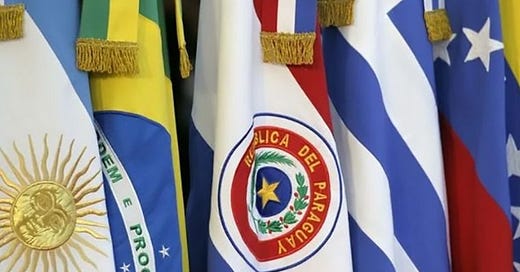The presidents of South America’s Mercosur bloc — Argentina, Brazil, Paraguay and Uruguay — meet today in Argentina’s Puerto de Iguazú, where Brazil will assume the bloc’s six-month rotating presidency. The Paraguayan delegation will include outgoing President Mario Abdo and President-Elect Santiago Peña, who will take office in August. (Buenos Aires Herald)
Brazilian President Luiz Inacio Lula da Silva said, yesterday, that the Mercosur bloc wants a trade agreement with the European Union to be a "win-win" situation. "We don't want impositions on the Mercosur," Lula said in a live broadcast on social media. "It's a deal of strategic partners, so one cannot threaten the other. Let's sit down and work out our differences." (Reuters)
Brazil has particularly pushed back against environmental clauses introduced by the European Union. Brazil's Foreign Minister Mauro Vieira said his country would submit a draft counter-proposal to the EU within days.
Argentina’s foreign minister Santiago Cafiero called for an “update” to the draft agreement between the European Union and Mercosur, which he said "reflects an unequal effort between asymmetrical blocs.” Under the draft deal, Mercosur will scrap tariffs on 95 percent of agricultural imports from Europe, which reciprocates with only 82 percent. (AFP, El Cronista)
Given the divide, the most that could come out of the Argentina summit was "a specific agenda" with "demands,” Inter-American Dialogue expert Bruno Binetti told AFP.
More Regional Relations
Incoming Paraguayan President Santiago Peña is expected to soften his country’s diplomatic stance towards Venezuela’s Nicolás Maduro government, and could pave the way for the country’s return to Mercosur, according to La Política Online, which said the policy responds to pushing from Lula and Peña’s desire to prioritize the relationship with Brazil.
Mercosur member nations’ economic authorities participated in a meeting in which they discussed use of local currencies for interbloc trade. (El Cronista)
The planned free trade deal between the EU and Mercosur risks increasing demand for farm produce from Brazil at the expense of Indigenous people's land and rights, Brazilian Indigenous leader Dinamam Tuxa told Reuters last week.
Regional
Experts fear that that the El Niño pattern coupled with a climate-change-induced sharp increase in temperatures in the north Atlantic could lead to widespread damage from extreme weather. (The Guardian)
Brazil
Brazil’s Federal Police detected no new illegal mines on Yanomami territory in over a month, the longest absence since monitoring began almost three years ago. This follows a steady decline in new mining, “another indicator that Brazil’s new policies are effectively combating the illicit gold industry,” reports InSight Crime. “But for progress to continue, wildcat miners will need alternative economic opportunities.”
“Two words summarize the secret formula that made Curitiba a model of sustainability: orderly growth,” according to El País. Now urban planner Rafael Greca is the city’s mayor and he has an ambitious plan for Curitiba to adapt to and mitigate climate change. (El País)
Honduras
Honduras is the Latin American country that most depends on remittances, which make up almost 29% of its GDP. The money is an economic lifeline for families, but remittances “also remove much of the incentive for the government to provide basic services or combat the root causes of migration, such as crime and a lack of opportunity at home,” argues Gina Kawas in Americas Quarterly. “This “remittances trap” keeps Honduras, and its government, on life support—but at a steep cost.”
Regional Relations
Fulton Armstrong delves into the story about Chinese “spy bases” in Cuba at La Tertulia, and posits that political maneuvering might trump actual intelligence concerns, as has occurred on numerous occasions over the past 70 years of bilateral tensions between the U.S. and Cuba.
“‘Leaks’ like those reportedly driving these reports are an effective political tool – a dirty weapon – because a) they create an (incorrect) assumption that there’s some truth to them, b) the source and information are inherently unverifiable, and c) they nonetheless give momentum to whatever exaggerations or fake news they’re trying to spread.” (See also William LeoGrande’s recent Responsible Statecraft piece on “weaponizing leaks.”)
Fifty years after Guyana, Barbados, Jamaica, and Trinidad and Tobago joined to form the Caribbean Community, CARICOM has developed into “a regional political and economic grouping of 15 Caribbean countries that includes French-speaking Haiti and Dutch-speaking Suriname. All but one, Montserrat, a British dependent territory in the eastern Caribbean, are independent. The other five British dependent territories of the Caribbean region are associate members,” reports the Miami Herald, on the regional bloc’s Jubilee.
Migration
From smuggling to trafficking: One migrant's nightmare on the Guatemala-Mexico border — InSight Crime.
Culinary Corner
“Mexico will no longer allow tortillas to be made with genetically modified corn. This story involves a trade spat — worth billions — with the U.S. and a tradition that spans millennia.” — NPR’s All Things Considered





